
Anthology
of Louisiana Literature
Katharine B. Judson.
Myths and Legends of the Mississippi Valley and the Great Lakes.
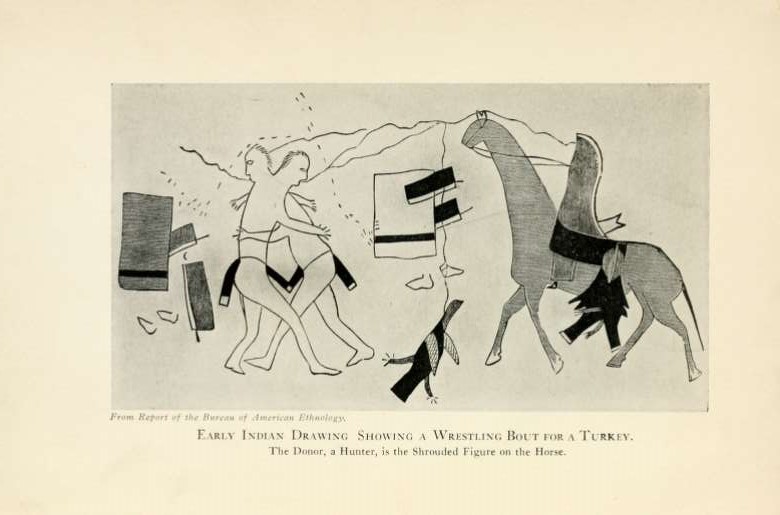
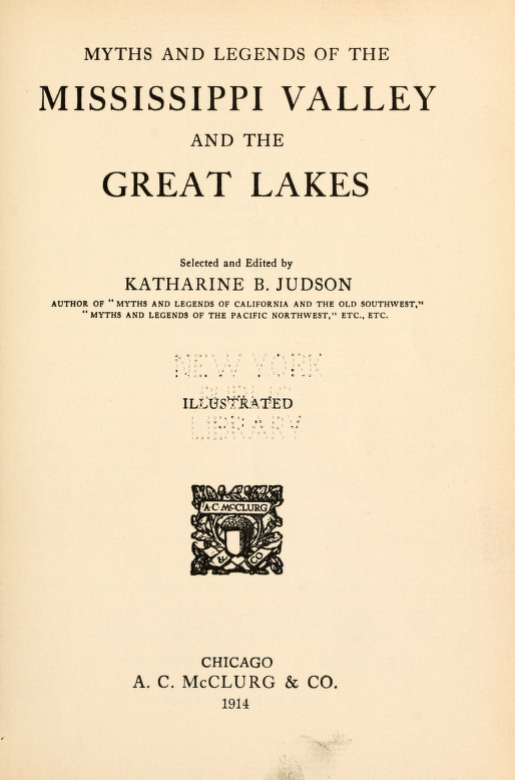
TABLE OF CONTENTS

Chitimacha
THERE
was a Creator of All Things. This Great Mystery understood all things. He had no eyes, yet he could see. He had no ears, yet he could hear. He had a body, but it could not be seen.
When the earth was first made, the Creator of All Things placed it under the water. The fish were first created. But when the Creator wanted to make men, there was no dry land. Therefore Crawfish was sent down to bring up a little earth. He brought up mud in his claws. Immediately it spread out and the earth appeared above the waters. Then the Great Mystery made men. He made the Chitimachas. It was at Natchez that he first made them.
He gave them laws but the people did not follow the laws. Therefore many troubles came, so that the Creator could not rest. Therefore the Creator made tobacco. Then men could become quiet and rest. Afterwards he made women, but at first they were like wood. So he directed a chief to teach them how to move, and how to cook, and to sew skins.
Now when the animals met the Chitimachas, they ridiculed them. For these men had no fur, and no wool, and no feathers to protect them from storms, or rain, or the hot sun. The Chitimachas were sad because of this.
Then the Creator gave them bows and arrows, and taught them how these things should be used. He told them that the flesh of the animals was good for food, and their skins for covering. Thus the animals were punished.
The Creator taught them also how to draw fire from two pieces of wood, one flat and the other pointed; thus they learned to cook their food. The Creator taught them also to honor the bones of their relatives; and so long as they lived, to bring them food.
Now in those days, the animals took part in the councils of men. They gave advice to men, being wiser. Each animal took especial care of the Chitimachas. Therefore the Indians respect the animals which gave good advice to their ancestors, and this aids them even today in time of need.
The Creator also made the moon and the stars. Both were to give life and light to all things on earth. Moon forgot the sacred bathing, therefore he is pale and weak, giving but little light to man. But Sun gives light to all things. Sun often stops on her trail
to give more time to the Indians when they are hunting, or righting their enemies. Moon does not, but always pursues his wife over the sky trail. Yet he can never catch up with her.
The mounds in the Chitimacha country are the camping places of the spirit sent down by the Creator to visit the Indians. This spirit taught the men how to cook their food and to cure their wounds. He is still highly honored.
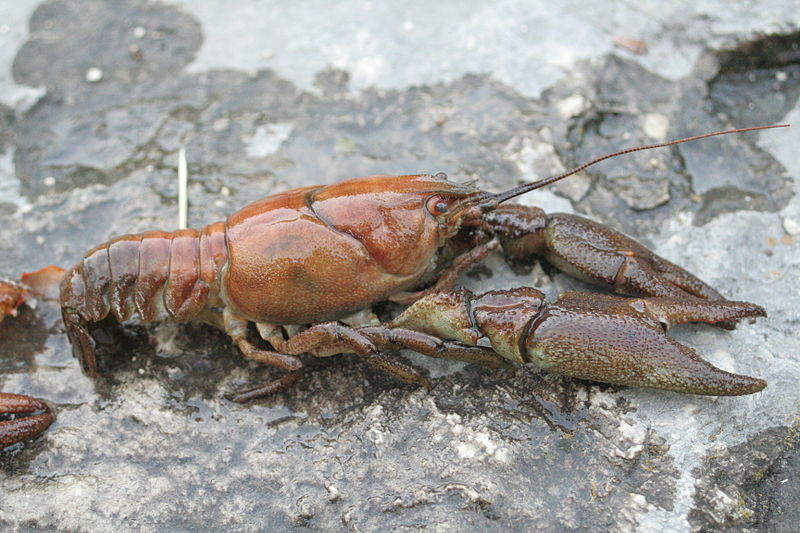
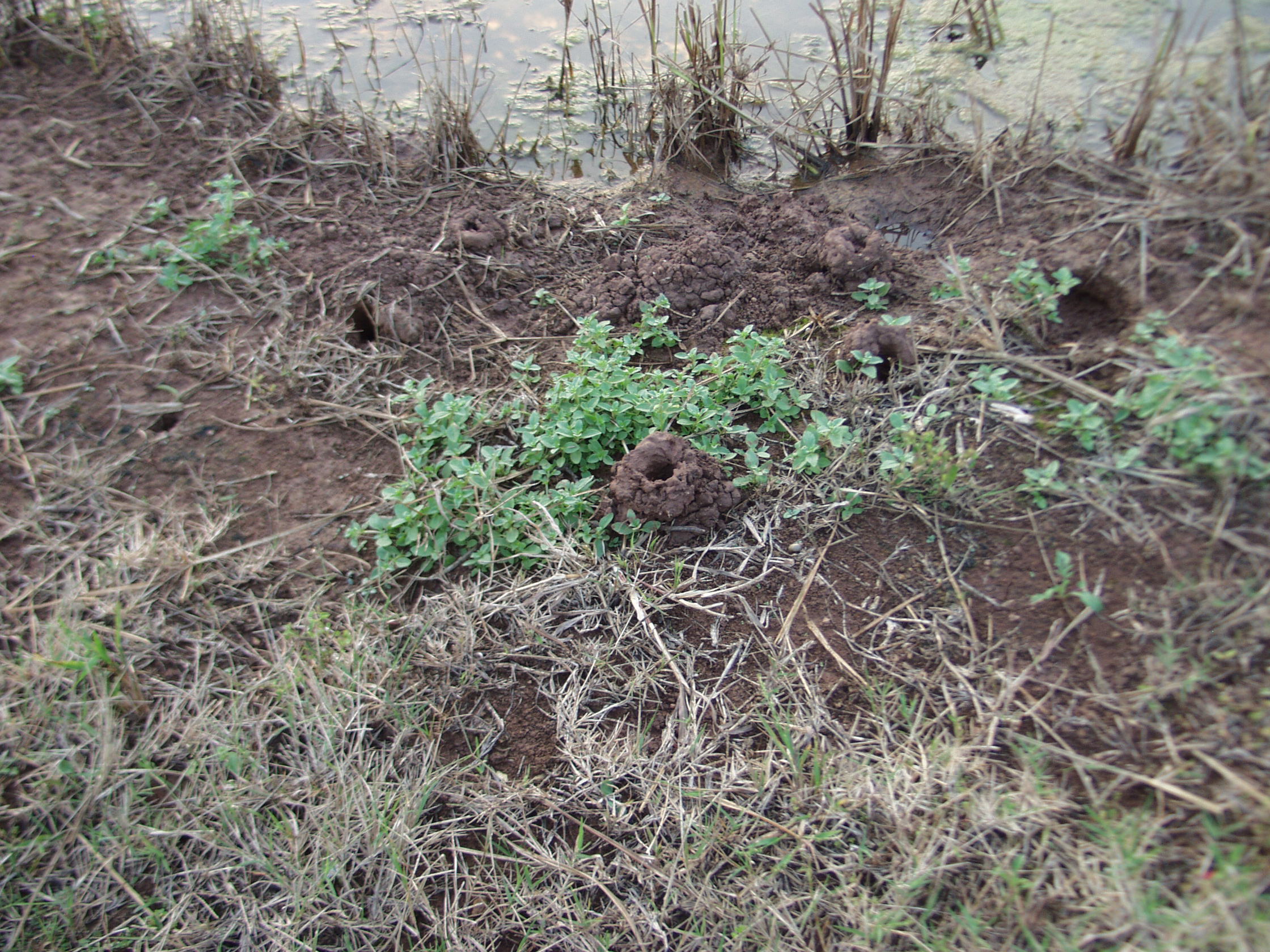

Biloxi
KUTI MANDKCE,
the One Above, made people. He made one person, an Indian. While the Indian was sleeping,
He made a woman.
Then the One Above went away to find food for the man and woman.
After he left, something was standing there upright. It was a tree. A person said, “Why do you not eat the fruit of this tree? I think he made it for you to eat.”
So the woman pulled off some fruit and stewed it and she and the Indian ate it. Shortly after, the One Above returned. Now he had gone away to find food for them. When he found they had stewed this fruit, he was very angry. He said, “Work for yourself. Find your own food, else you shall be hungry.”
When the One Above had been a long time gone, he sent back a letter to the Indians. But the Indians did not receive it, because the Americans took it. That is why Americans know how to read and write.
Now after the letter came, the people found a very clear stream of water. The American found it first and lay down in it; therefore he is very white all over. Next came the Frenchman, but the water was not so clear. Then came the Indians; therefore Indians are not of light complexion, because they did not find the water when it was clear. Afterwards came the Spaniard, and he was not white, because the water had become very muddy.
Some time after the Negro was made. The One Above thought he should attend to work, so he made the Negro's nose flat. And by this time the water was very muddy, and the stream was very low. So the Negro washed only the palms of his hands. Therefore Negroes are very black except on the palms of their hands.

Chitimacha
LONG,
long ago, a great storm came. At once the people baked a great earthen pot, and in this two of them saved themselves. The pot was held up on the surface of the water. Now two rattlesnakes were also saved in the earthen jar, because in the olden days rattlesnakes were the friends of man. In those days, when an Indian left his lodge the rattlesnake entered it and protected it until he returned.
When all the land was flooded, the red-headed woodpecker hooked his claws into the sky and so hung above the waters. But the flood rose so high that part of his tail was wet. You can see the marks even to this day.
When the waters sank, he was sent to find land. He could find none. Then a dove was sent and came back with a grain of sand. This sand was placed on top of the great waters and immediately it stretched out. It became dry land. Therefore the dove is called “Ground Watcher.”

Chitimacha
FIRE
first came from the Great Being, Kutnakin. He gave it into the care of an Indian so old that he was blind.
Now the Indians all knew that fire was good, therefore they tried to steal it. The old man could not see them when they came stealthily to his wigwam, but he could feel the presence of anyone. Then he would beat about him with his stick until he drove away the seekers for fire.
Now one day an Indian seized the fire suddenly. At once the Watcher of the Fire began beating about him with his stick, until the thief dropped the fire. But the old man did not know he had dropped it. He still beat about him so fiercely with his stick that he pounded some of the fire into a log.

Chitimacha
LONG
ago, many Indians started to reach the Sky-world. They walked far to the north until they came to the edge of the sky, where it is fitted down over the Earth-plain. When they came to this place, they tried to slip through a crack under the edge, but the Sky-cover came down very tightly and quickly, and crushed all but six. These six had slipped through into the Sky-land.
Then these men began to climb up, walking far over the sky floor. At last they came to the lodge of Kut-nakin. They stayed with him as his guests. At last they wished to go back to their own lodges on the Earth-plain.
Kutnakin said, “How will you go down to the Earth-plain?”
One said, “I will go down as a squirrel.” So he started to spring down from the Sky-land. He was dashed to pieces.
Kutnakin said to the next, “How will you go down to the Earth-plain?”
And this man also went as an animal. And so the next one also. They were dashed to pieces. Then the others saw that they were crushed by their fall.
Therefore the fourth said, “I will go down as a spider.” And he spun a long line down which he climbed safely to earth.
The fifth said, “I will go down as an eagle,” and he spread his wings and circled through the air until he alighted on a tree branch.
The last one said, “I will go down as a pigeon,” and so he came softly to earth.
Now each one brought back a gift from Kutnakin. The one who came back as a spider had learned how to howl and sing and dance when people were sick. He was the first medicine man. But one Indian had died while these six men were up in the Sky-land. He died before the shaman came down to earth as a spider. Therefore death came among the Indians. Had the shaman come back to earth in time to heal this Indian, there would have been no death.
The one who came back as an eagle taught men how to fish. And the pigeon taught the Indians the use of wild maize.
Thus the Ottawas received the gift of corn.

Choctaw
AFTER
a man dies, he must travel far on the death trail. It journeys to the Darkening-land, where Sun slips over the edge of the Earth-plain. Then the spirit comes to a deep, rapid stream. There are steep and rugged hills on each side, so that one may not follow a land trail. The Trail of the Dead leads over the stream, and the only bridge is a pine log. It is a very slippery log, and even the bark has been peeled off. Also on the other side of the bridge are six persons. They have rocks in their hands, and throw them at spirits when they are just at the middle of the log.
Now when an evil spirit sees the stones coming, he tries to dodge them. Therefore he slips off the log. He falls far into the water below, where are evil things. The water carries him around and around, as in a whirlpool, and then brings him back again among the evil things. Sometimes evil spirit climbs up on the rocks and looks over into the country of the good spirits. But he cannot go there.
Now the good spirit walks over safely. He does not mind the stones and does not dodge them. He crosses the stream and goes to a good hunting land. It is more beautiful there than on the Earth-plain. There are no storms. The sky is always blue, and the grass is green, and there are many buffaloes. Therefore there is always feasting and dancing.

Biloxi
RABBIT
aided his friend the Frenchman with his work. They planted potatoes. Rabbit looked upon the potato vines as his share of the crop and ate them all.
Again Rabbit aided his friend the Frenchman. This time they planted corn. When it was grown, Rabbit said, “This time I will eat the roots.” So he pulled up all the corn by the roots, but he found nothing to satisfy his hunger.
Then the Frenchman said, “Let us dig a well.” Rabbit said, “No. You dig it alone.”
The Frenchman said, “Then you shall not drink water from the well.”
“That does not matter,” said Rabbit. “I am used to licking off the dew from the ground.”
So the Frenchman dug his well. Then he made a tar baby and stuck it up close to the well. One day Rabbit came near the well, carrying a long piece of hollow cane and a tin bucket. When he reached the well he spoke to the tar baby; it did not answer.
“Friend, what is the matter? Are you angry? “asked Rabbit.
Tar baby did not answer. So Rabbit hit him with a forepaw. The forepaw stuck there.
“Let me go,” said Rabbit, “or I will hit you on the other side.”
Tar baby paid no attention, so Rabbit hit him with the other forepaw, and that stuck fast.
“I will kick you,” said Rabbit. But when he kicked him the hindpaw stuck.
“Very well,” he said, “I will kick you with the other foot. So he kicked him with the other foot and that stuck fast. By that time Rabbit looked like a ball, all four paws sticking to the tar baby.
Just then the Frenchman came to the well. He picked Rabbit up, tied his paws together, laid him down and scolded him. Rabbit pretended to be in great fear of a brier patch.
“If you are so afraid of a brier patch,” said the Frenchman, “I will throw you into one.”
“Oh, no, no!” said Rabbit.
“I will throw you into the brier patch,” repeated the Frenchman.
“I am much afraid of it,” answered Rabbit.
“Since you are in such dread of it, I will throw you into it,” said the Frenchman. So he picked up Rabbit and threw him far into the brier patch. Rabbit fell far away from the Frenchman.
Then he picked himself up and ran off, laughing at the trick he had played on the Frenchman.

Biloxi
RABBIT
and Bear had been friends for some time. One day Rabbit said to Bear, “Come and visit me. I live in a very large brier patch.” Then he went home.
When he reached home he went out and gathered a quantity of young canes which he hung up.
After a while Bear reached a place near his house, but was seeking the large brier patch. Now Rabbit really dwelt in a very small patch. When Rabbit found that Bear was near, he began to make a pattering sound with his feet.
Bear was scared. He retreated to a distance and then stopped and stood listening. As soon as Rabbit saw this, he cried out, “Halloo! my friend! Was it you whom I treated in that manner? Come and take a seat.”
So Bear went back to Rabbit’s house and took a seat. Rabbit gave the young canes to his guest, who swallowed them all. Rabbit nibbled now and then at one, while Bear swallowed all the others.
“This is what I have always liked,” said Bear when he went home. “Come and visit me. I dwell in a large bent tree.”
Not long after, Rabbit started on his journey. He spent some time seeking the large bent tree but he could not find it. Bear lived in a hollow tree, and he sat there growling. Rabbit heard the growls and fled for some distance before he sat down.
Then Bear called, “Halloo! my friend! Was it you whom I treated in that manner? Come here and sit down.”
Rabbit did so.
Bear said, “You are now my guest, but there is nothing for you to eat.” So Bear went in search of food.
Bear went to gather young canes, but as he went along, he gathered also the small black bugs which live in decayed logs. When he had been gone some time, he returned to his lodge with only a few young canes. He put them down before Rabbit and then walked around him in a circle. In a little while, he offered Rabbit the black bugs.
“I have never eaten such food,” said Rabbit.
Bear was offended. He said, “When I was your guest, I ate all the food you gave me, as I liked it very well. Now when I offer you food, why do you treat
me in this way?” Then Bear said, also, “Before the sun sets, I shall kill you.”
Rabbit’s heart beat hard from terror, for Bear stood at the entrance of the hollow log to prevent his escape. But Rabbit was very nimble. He dodged first this way and then that, and with a long leap he got out of the hollow tree. He went at once to his brier patch and sat down.
Rabbit was very angry with Bear. He shouted to him, “When people are hunting you, I will go toward your hiding place, and show them where you are.”
That is why, when dogs hunt a rabbit, they always shoot a bear. That is all.

Biloxi
RABBIT
and his grandmother lived in a wigwam. Rabbit used to go hunting every day, very early in the morning. But no matter how early he went, a person leaving long footprints had passed along ahead of him. Each morning Rabbit thought, “I will reach there before him.” Yet each morning the person leaving long footprints passed before him.

One morning Rabbit said to his grandmother, “Oh, Grandmother, although I have long wished to be the first to get there, again has he got there ahead of me. Oh, Grandmother, I will make a noose, and I will place it in the trail of that one, and thus I will catch him.”
“Why should you do that?” asked grandmother.
“I hate that person,” said Rabbit. He departed. When he reached there, he found that the person had already departed. So he lay down near by and waited for night. Then he went to the trail where the person with long feet had been passing, and set a snare.


Very early the next morning he went to look at his trap. Behold! Sun had been caught. Rabbit ran home very quickly.
“Oh, Grandmother, I have caught something but it scares me. I wished to take the noose, but it scared me every time I went to get it.”
Then Rabbit took a knife and again went there. The person said, “You have done very wrong. Come and release me.”
Rabbit did not go directly toward him. He went to one side. He bent his head low and cut the cord. At once Sun went above on his trail. But Rabbit had been so near him that Sun burned his fur on the back of his neck.
Rabbit ran home. He cried, “Oh, Grandmother, I have been severely burned.”
“Alas! My grandson has been severely burned,” said grandmother.

Biloxi
THE
Ancient of Ants was building a house. She worked hard to finish her house before the cold weather came.
Now when it was very cold, the Katydid and the Locust reached her house, asking for shelter. They said they had no houses.
The Ancient of Ants scolded them. She said, “After you are grown up, in the warm weather, you sing all the time, instead of building a house.” She would not let them come into her house.
Then the Katydid and the Locust were ashamed, and as the weather was very cold, they died. That is why katydids and locusts die every winter, while the ants live in their warm houses. But the katydids and locusts never do anything in warm weather but sing.

Chitimacha
ONE
day an Indian became so angry with everyone that he set the sea marshes on fire because he wanted to burn up the world. A little blackbird saw it. He flew up into a tree and shouted, “Ku nam wi cu! Ku nam wi cu! The world and all is going to burn.”
The man said, “If you do not go away, I will kill you.” But the bird only kept shouting, “Ku nam wi cu! The world and all is going to burn.”
Then the Indian threw a shell and hit the little bird on the wings, making them bleed. That is how the red-winged blackbird came by its red wings.
Now when people saw the marshes burning, they quickly ran down and killed game which had been driven from it by the fire. Then they said to the angry man,
“Because you put fire in those tall weeds, the deer and bear and other animals have been driven out and we have killed them. You have aided us by burning them.”
Nowadays when the red-winged blackbird comes around the house, he still shouts, Ku nam wi cu, so they say.

Biloxi
ONCE
upon a time, they say, the world turned over. Then the waters rose very high and many people died. A woman took two children and lodged in a tree. She sat there waiting for the waters to sink, for she had no way of reaching the ground.
When the woman saw the Ancient of Red-headed Buzzards, she called to him, “Help me to get down and I will give you one of the children.” He assisted her, but she did not give him the child.
The waters were so deep that the birds were clinging by their claws to the clouds, but their tails were under water. That is why their tails are always sharp. One of these birds was the Ancient of Yellowhammers. Therefore its tailfeathers are sharp at the ends. The large Red-headed Woodpecker was there, too, and the Ivory-billed Woodpecker, and that is why their tails
have their present shape.


Biloxi
THE
Ancient of Wildcats had been creeping up on the Wild Turkeys trying to catch some. He tried in vain. Then he got a bag, crawled inside, and rolled himself along. He rolled himself to the Ancient of Turkey Gobblers.
Wildcat said, “Get into my bag and see what fun it is to roll.”
The Ancient of Turkey Gobblers crawled into the bag. Wildcat tied up the end and rolled it along for some time. After he had rolled it quite a distance, he stopped and untied the bag.
“It is very good,” said the First of All the Turkey Gobblers. Then he said to the other Wild Turkeys, “Get in the bag and see how pleasant it is.”
But the young Turkeys were afraid. Gobbler urged them to try the new game. At last one young Turkey stepped into the bag. Wildcat tied the end and pretended that he was going to roll it. It would not go.
“It will not go because it is too light. There is only one in it,” said Wildcat. “Let another young Turkey step in.”
At last another young Turkey stepped in. Wildcat tied the bag, threw it over his shoulder and ran home. When he reached home he laid the bag down.
Then Wildcat said to his mother, “ I have brought home something on my back, and placed it outside. Beware lest you untie the bag.”
His mother said to herself, “I wonder what it can be.” So she untied the bag. One of the turkeys flew out. She managed to catch the other one. She caught both feet with one hand, and both wings with the other. She cried out, “Help! Help! I have caught four!”
The Ancient of Wildcats scolded his mother. Then he killed the turkey and cooked it. His mother went into another room.
Then Wildcat spread his feast. As he was eating the Turkey he made a constant noise. He walked back and forth. He talked continually and kept up a steady rattling. When he stopped the noise a little he said, “I am going home,” as if a guest were speaking. He said this again and again. He made a noise with his feet as if people were walking about. He ate all the turkey except the hip bone.

Biloxi
ONCE
upon a time the Ancient of Brants and the Ancient of Otters were living as friends. One day the Ancient of Otters said to the Ancient of Brants, “Come to see me tomorrow,” and departed.
Brant went to make the call. When he arrived, the Ancient of Otters said, “Halloo! I have nothing at all for you to eat! Sit down!” Then he went fishing. He used a “leather vine” which he jerked now and then to straighten it. He caught many fish. When he reached home he cooked them.
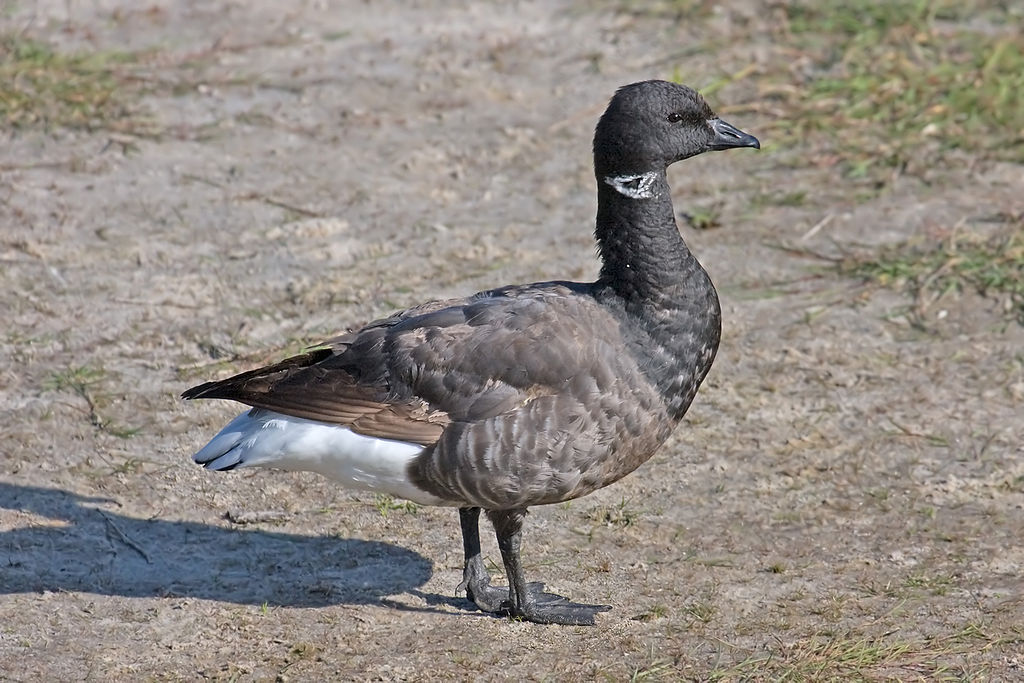
|
|
Brant Goose
|
When the fish were cooked, ready for the feast, the Ancient of Otters put some into a very flat dish. But the Ancient of Brants could not eat from a flat dish. All he could do was to hit his bill against the dish, and raise his head as if swallowing something. But Otter ate rapidly.
Otter said to his guest, “Have you eaten enough?”
“Yes, I am satisfied,” said Brant.
“No, you are not satisfied,” said Otter. He took more fish and placed them in the flat dish, eating rapidly as before. Brant could only hit his bill against the side of the dish.
When the Ancient of Brants was departing, he said to Otter, “Come to see me tomorrow.”
When Otter reached the house of the Ancient of Brants the next day, Brant cried, “Halloo! I have nothing at all to give you to eat! Sit down!”
Then the Ancient of Brants went fishing, using a “leather vine” which he jerked now and then to straighten it. He caught many fish and took them home to cook them. When the fish were cooked, they began to feast. But the Ancient of Brants had put some into a small round dish. Ancient of Otters could not get his mouth into the dish. But Brant ate rapidly.
“Have you eaten enough?” Brant asked, after a while.
Otter replied, “Yes, I am satisfied.”
“Nonsense!” said the Ancient of Brants. “How could you possibly be satisfied! I have served you as you served me.”
But this ended their friendship.

Biloxi
THE
Ancient of
Tiny Frogs
was shut up by his grandmother, so that he might learn magic. Then she took him on a journey.
First they met the Ancient of Panthers. The grandmother said to him, “This is your sister’s son. Look at him and wrestle with him.” The Ancient of Panthers was very brave. To show his strength, he climbed very high up a tree which he tore to pieces, falling to the ground with it.
Then he seized the Ancient of Tiny Frogs. But the frog caught him by the hind legs and whipped him against a tree. He beat him so severely that Panther's jaw was broken in many places. That is why all panthers have a short jaw.
The Ancient of Tiny Frogs and his grandmother continued their journey. Next they met Bear. The grandmother said to him, “Look at your sister's son.
Go and wrestle with him.” Bear began to pull the limbs off a tree to show his strength. Soon he rushed upon the Ancient of Tiny Frogs. But that one caught Bear by the hind legs and beat him against a tree until he broke off short his tail. That is why bears have such very short tails.
Again the old grandmother, singing as she walked, went along the trail with her grandson. They met Buffalo. She said, “Look at your sister's son. Go and wrestle with him.” Now Buffalo was very strong. With his horns he uprooted a tree, and then spent some moments in breaking it to pieces. Then he rushed at the Ancient of Tiny Frogs. But that one caught Buffalo by the hind legs and beat him against a tree. He beat him until the back of his neck was broken and he had a great hump on his shoulders. So Buffalo went away, but that is why buffaloes have such very heavy, humpbacked shoulders.
Again they walked along the trail, singing. It was not long before they met with Deer. To him the grandmother said, “Look at your sister's son. Go and wrestle with him.” Deer leaped up to show his agility. Then he sprang at the Ancient of Tiny Frogs. But that one seized him by the legs and beat him against a tree, breaking his nose, and leaving him with a very small nose, even as deer today have small noses.
Then the Ancient of Tiny Frogs said to Deer: “I shall remain here under the leaves. When hunters are after you and have almost reached you, I will urge you to escape by saying, “Pés! Pés! When I say that, do your best to get away.”
Hardly had he finished speaking, when he cried out, “Pés! Pés! It is so! Go quickly! Do your best!” Then Deer leaped away. For just then the hunters had come, sure enough.
Therefore, when a tiny frog cries out now, people say that some one is on the point of running after a deer.

Choctaw (Bayou Lacomb)
KASHEHOTAPALO
is the frightener of hunters. His head is small and dried up, like an old man's. His legs and feet are like those of a deer. He lives in low, swampy places, far away from men.
If the hunters come near him, when they are chasing a deer, he slips up behind them and calls loudly. Thus he frightens them away. His voice is like that of a woman. His name means “the woman call.”

Choctaw (Bayou Lacomb)
ALL
the hunters in a village killed many deer one winter, except one man. This one saw many deer. Sometimes he drew his bow and shot at them; yet they escaped.
Now this hunter had been away from his village three days. He had seen many deer; not one had he killed. On the third day, when the sun was hot over his head, he saw an alligator.
Alligator was in a dry, sandy spot. He had had no water for many days. He was dry and shriveled.
Alligator said to the hunter, “Where can water be found?” The hunter said, “In that forest, not far away, is cold water.”
“I cannot go there alone,” said Alligator. “Come nearer. Do not fear.” The hunter went nearer, but he was afraid.
“You are a hunter,” said Alligator, “but all the deer escape you. Carry me into the water, and I will make you a great hunter. You shall kill many deer.”
The hunter was still afraid. Then he said, “I will carry you, but first I must bind you so that you cannot scratch me; and your mouth, so that you cannot bite me.”
So Alligator rolled over on his back and let the hunter bind him. He fastened his legs and mouth firmly. Then he carried Alligator on his shoulders to the water in the forest. He unfastened the cords and threw him in.
Alligator came to the surface three times. He said, “Take your bow and arrow and go into the woods. You will find a small doe. Do not kill it. Then you will find a large doe. Do not kill it. You will meet a small buck. Do not kill that. Then you will meet a large, old buck. Kill that.”
The hunter took his bow and arrow. Everything happened just as Alligator had foretold. Then he killed the large, old buck. So he became a very great hunter. There was always venison in his wigwam.

Biloxi
THE
Ancient of Opossums thought that he would reach a certain pond very early in the morning, so that he might catch the crawfish on the shore. But someone else reached there first, and when Opossum reached there the crawfish were all gone.
This person did this every day. Opossum did not know who it was, so he lay in wait for him. He found it was the Ancient of Racoons.
They argued about the crawfish and the pond. They agreed to see which could rise the earlier in the morning, go around the shore of the pond and catch the crawfish.
Racoon said, “I rise very early. I never sleep until daylight comes.”
Opossum said the same thing. Then each went home.
Now Opossum lay down in a hollow tree and slept there a long time. He arose when the sun was very high and went to the pond. But Racoon had been there ahead of him, and had eaten all the crawfish. Racoon sang the Song of the Racoon as he was going home. Opossum stood listening. He, too, sang. He sang the Song of the Opossum, thus:
Hí na kí-yu wus-sé-di
He met the Racoon who had eaten all the crawfish.
“Ha!” said Racoon. “I have been eating very long, and I was going home, as I was sleepy.”
Opossum said, “I, too, have been eating so long that I am sleepy, so I am going home.”
Opossum was always telling a lie. People say this of the Opossum because if one hits that animal and throws it down for dead, soon it gets up and walks off.

Choctaw (Bayou Lacomb)
VERY
little food there was for Deer one dry season. He became thin and weak. One day he met ’Possum. Deer at once exclaimed, “Why, ’Possum, how fat you are! How do you keep so fat when I cannot find enough to eat?”
’Possum said, “I live on persimmons. They are very large this year, so I have all I want to eat.”
“How do you get the persimmons?” asked Deer. “They grow so high!”
“That is easy,” said ’Possum. “I go to the top of a high hill. Then I run down and strike a persimmon tree so hard with my head that all the ripe persimmons drop on the ground. Then I sit there and eat them.”
“That is easily done,” said Deer. “I will try it. Now watch me.”
’Possum waited. Deer went to the top of a nearby hill. He ran down and struck the tree with his head. ’Possum watched him, laughing. He opened his mouth so wide while he laughed that he stretched it. That is why ’Possum has such a large mouth.
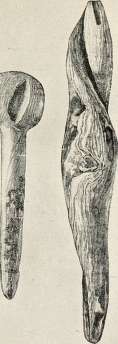

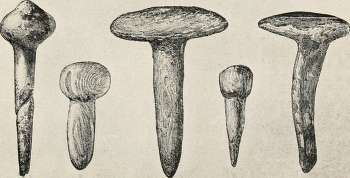 Shell Pins Made and Used by Indians of the Mississippi Valley. Found in Graves.
Shell Pins Made and Used by Indians of the Mississippi Valley. Found in Graves.

Choctaw (Bayou Lacomb)
TASHKA
and Walo were brothers. They lived a long while ago, so they say. Every morning they saw Sun come up over the edge of the earth. Then he followed the trail through the sky.
When they were four years old, they started to follow Sun’s trail. They walked all day, but that night when Sun died, they were still in their own country. They knew all the hills and rivers. Then they slept.
Next morning they began again to follow Sun, but when he died at the edge of the earth, they could still see their own land.
Then they followed Sun many years. At last they became grown men.
One day they reached a great sea-water. There was no land except the shore on which they stood. When Sun went down over the edge of the earth that day, they saw him sink into the waters. Then they crossed the sea-water, to the edge. So they came to Sun’s home.
All around there were many women. The stars are women, and Moon also. Moon is Sun’s wife.
Moon asked them how they had found their way. They were very far from their own land. They said, “For many years we have followed Sun’s trail.”
Sun said, “Do you know your way home?” They said, “No.” So Sun took them up to the edge of the water. They could see the earth, but they could not see their own land.
Sun asked, “Why did you follow me?” They said, “We wished to see where you lived.”
Sun said, “I will send you home. But for four days you must not speak a word to any person. If you do not speak, you shall live long. You shall have much wealth.”
Then Sun called to Buzzard. He put the two brothers on Buzzard's back. He said, “Take them back to earth.” So Buzzard started for the earth.
Now the clouds are halfway between heaven and earth. The wind never blows above the clouds, so they say.
Buzzard flew from heaven to the clouds. The brothers could easily keep their hold. Then Buzzard flew from the clouds to the earth. But now Wind blew them in all directions. Then at last they came to earth. They saw the trees around their own village. They rested under the trees. An old man passing by knew them. So he went down the trail and told their mother. She at once hastened to see them. When she met them, she began to talk. She made them talk to her. They told her. So they spoke before the four days were ended. Therefore Sun could not keep his promise.

Biloxi
IN OLDEN
days, the Moon Person used to make visits to the Indians. One day a child put out a dirty little hand and made a black spot on Moon Person. Therefore Moon felt ashamed and when night came he disappeared. He went up above. He stays up above all the time now, so they say. Sometimes he is dressed altogether in a shining robe, and therefore he is bright at night. But immediately afterwards he disappears. You can still see the black spot, so they say.

Chitimacha
A LITTLE
boy named Ustapu was one day lying on the shore of a lake. His people had just reached the shore from the prairies, but the wind was too high for them to cross.
As he lay there, he suddenly saw another boy fanning himself with a fan of turkey wings. This was the boy who made the West Wind. Ustapu said to his tribe, “I can break the arm of the boy who makes West Wind.” But they laughed at him. He took a shell and threw it at the boy and struck his left arm.
Therefore when the west wind is high, the Indians say that the boy is using his strong arm. When the west wind is a gentle breeze, they say he is using his injured arm. Before that, the west wind had always been so strong it was very disagreeable, because Wind-maker could use both arms. Now it is much gentler.
The Indians think this boy also made the other winds.

Natchez
THE
Natchez begin the year in March, each being a lunar month. Therefore there are thirteen.
- Deer month
- Strawberry month
- Little Corn month
- Watermelon month
- Peach month (July)
- Mulberry month
- Great Corn month (maize)
- Turkey month (October)
- Bison month
- Bear month
- Cold meal month (January)
- Chestnut month
- Nut month (nuts broken to make bread, at the close of winter, when supplies run low)

Notes
- He made a woman.
Obviously influenced by missionary teaching, but a most curious myth. [Judson’s note].
-
Tiny frogs.
The tiny frog, called péska, is a black one, not more than an inch long, living in muddy streams in Louisiana. It differs from the bullfrog, common frog, and tree frog. [Judson’s note].
Text prepared by:
- Jacob Nelson
- Bruce R. Magee
- Kaitlyn Plauche
Source
Judson, Katharine Berry. Myths and Legends of the Mississippi Valley and the Great Lakes. Chicago: A. C. McClurg & Co., 1914. Internet Archive. Web. 22 June 2007.
20 November 2013. <https:// archive.org/ details/ myths legends ofmi00juds>.

Anthology of Louisiana Literature














